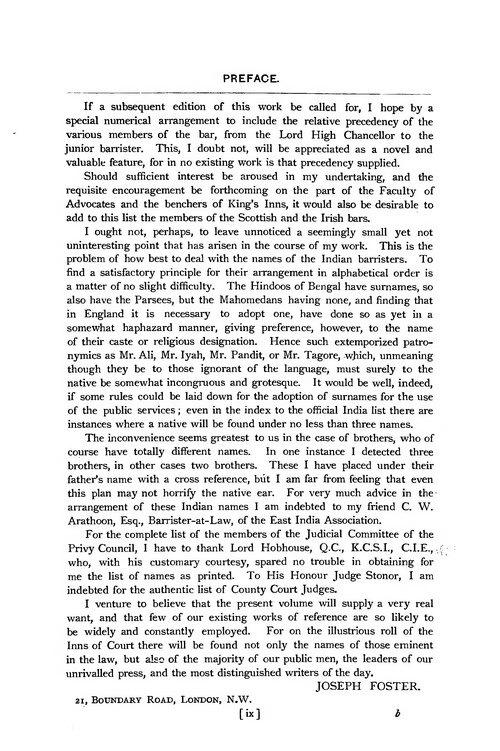PREFACE.
If a subsequent edition of this work be called for, I hope by a special numerical arrangement to include the relative precedency of the various members of the bar, from the Lord High Chancellor to the junior barrister. This, I doubt not, will be appreciated as a novel and valuable feature, for in no existing work is that precedency supplied.
Should sufficient interest be aroused in my undertaking, and the requisite encouragement be forthcoming on the part of the Faculty of Advocates and the benchers of King's Inns, it would also be desirable to add to this list the members of the Scottish and the Irish bars.
I ought not, perhaps, to leave unnoticed a seemingly small yet not uninteresting point that has arisen in the course of my work. This is the problem of how best to deal with the names of the Indian barristers. To find a satisfactory principle for their arrangement in alphabetical order is a matter of no slight difficulty. The Hindoos of Bengal have surnames, so also have the Parsees, but the Mahomedans having none, and finding that in England it is necessary to adopt one, have done so as yet in a somewhat haphazard manner, giving preference, however, to the name of their caste or religious designation. Hence such extemporized patronymics as Mr. Ali, Mr. Iyah, Mr. Pandit, or Mr. Tagore, which, unmeaning though they be to those ignorant of the language, must surely to the native be somewhat incongruous and grotesque. It would be well, indeed, if some rules could be laid down for the adoption of surnames for the use of the public services; even in the index to the official India list there are instances where a native will be found under no less than three names.
The inconvenience seems greatest to us in the case of brothers, who of course have totally different names. In one instance I detected three brothers, in other cases two brothers. These I have placed under their father's name with a cross reference, but I am far from feeling that even this plan may not horrify the native ear. For very much advice in the arrangement of these Indian names I am indebted to my friend C. W. Arathoon, Esq., Barrister-at-Law, of the East India Association.
For the complete list of the members of the Judicial Committee of the Privy Council, I have to thank Lord Hobhouse, Q.C., K.C.S.I., C.I.E., who, with his customary courtesy, spared no trouble in obtaining for me the list of names as printed. To His Honour Judge Stonor, I am indebted for the authentic list of County Court Judges.
I venture to believe that the present volume will supply a very real want, and that few of our existing works of reference are so likely to be widely and constantly employed. For on the illustrious roll of the Inns of Court there will be found not only the names of those eminent in the law, but also of the majority of our public men, the leaders of our unrivalled press, and the most distinguished writers of the day.
21, Boundary Road, London, N.W.
[ix]
